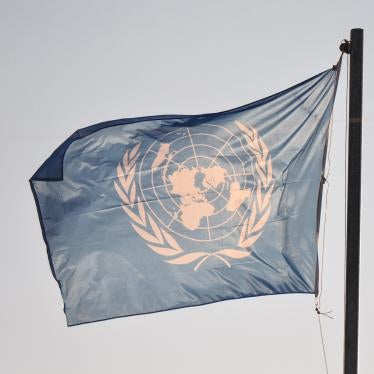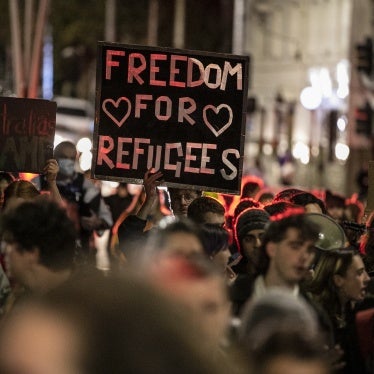The clock is ticking on whether Pakistan’s government will send an alleged child offender to the gallows next week.
An anti-terrorism court in Karachi on June 1 ordered the execution of Shafqat Hussain on June 9. The impending execution is the latest twist in Hussain’s case since the government halted his execution on March 19, just hours before he was to be hanged at Karachi’s Central Jail. That stay of execution came at the request of Interior Minister Chaudhry Nisar Ali Khan, who subsequently announced a 30-day delay to clarify concerns about Hussain’s age at the time of arrest.
An anti-terrorism court in Karachi on March 12 had approved the execution of Hussain, who was allegedly 14 or 15 years old when sentenced in 2004 for kidnapping and killing a 7-year-old boy.
Judicial authorities maintain that he was in fact 23 years of age when incarcerated.
Hussain’s lawyers have reason to be skeptical about the government investigation to determine Hussain’s age. His legal team at Justice Project Pakistan had dismissed as “a sham” the December 2014 inquiry to clarify Hussain’s age and the circumstances of his conviction, concluding “[t]here was no inquiry conducted at all.” The Islamabad High Court’s May 21 rejection of an appeal from Hussain’s lawyers for the creation of a judicial commission to conclusively address concerns about his age have sealed his fate.
Pakistani law forbids the use of the death penalty against defendants under 18, and allegations that Hussain’s conviction was based on a confession that security forces in Sindh province had obtained through torture makes his plight even more alarming. That torture included electrical shocks to his genitals, pulling out three of his fingernails and burning him with cigarette butts. When Hussain’s brother Manzoor later asked him about the torture allegations, Shafqaat “started shivering and wet his pants.”
Hussain’s stay of execution is the exception in Pakistan’s ongoing death penalty spree that has resulted in 139 executions over the past six months. Pakistani authorities executed a total of 21 people on March 17-18 alone. Hundreds more of the estimated 8,000 people on death row may face the death penalty in the coming weeks as the result of an ongoing Interior Ministry review of death penalty cases. These executions are part of the vindictive and abusive government response to the horrific December 16 attack by the Pakistani Taliban splinter group Tehreek-e-Taliban on a school in Peshawar in northwestern Pakistan that left at least 148 dead – almost all of them children.
The government of Prime Minister Nawaz Sharif first moved to rescind a four-year unofficial death penalty moratorium for non-military personnel “in terrorism-related cases.”
In early March, the government then quietly lifted the death penalty moratorium for all capital crimes, including kidnapping and murder. The government’s motivations for its death penalty reinstatement have been a matter of populist pandering rather than pursuit of justice. The home minister for Punjab provincedescribed the country’s return to the use of the death penalty as a means to “boost the morale of the nation” in the wake of the Peshawar attack.
But the government’s re-embrace of the death penalty is just one element of its abusive response to the Peshawar school attack. On January 7, the government signed into law a constitutional amendment permitting military courts to prosecute civilian terrorism suspects. The amendment justifies the use of military courts as a means “to permanently wipe out and eradicate terrorists from Pakistan.” Although the constitutional amendment stipulates a two-year time limit on its use, it poses a long-term threat to legal due process and rule of law.
The military courts, which began operations on January 21, have issued their first death penalty verdicts, with many more likely to come. The government says it will use them to prosecute as many as 3,400 “jet black” terror suspects, though it has yet to give a precise definition for that term. Regardless, Sharif has enthusiastically touted the perceived benefits of military courts: on January 8, hetold reporters that terrorism suspects convicted by military courts will be hanged within “10-15 days” of sentencing.
Another toxic byproduct of the Pakistani government response to the Peshawar attack has been the abuse of registered Afghan refugees in the country. Despiteofficial assurances that the Pakistan government would maintain its “traditional hospitality” to Afghan refugees in the aftermath of the Peshawar attack, since December 16 there have been numerous reports of government and public harassment and intimidation against the country’s Afghan population. Those reports include accounts that police have threatened Afghans with arrest unless they leave the country immediately. Both the United Nations refugee agency (UNHCR) and the International Organization for Migration have attributed a sharp increase in the repatriation of both registered Afghans and undocumented Afghans in the weeks following the December 16 atrocity to coercion and harassment in Pakistan.
Pakistan is entitled to -- and is obligated to provide under international law – a rights-respecting response to militant attacks. Reinstatement of the death penalty, military trials for terrorism suspects and the scapegoating of the country’s Afghan population will only facilitate more human rights violations. Until the Pakistan government starts respecting human rights and the rule of law, Shafqat Hussain and many others will remain just steps away from the gallows.
Phelim Kine is deputy Asia director at Human Rights Watch.








